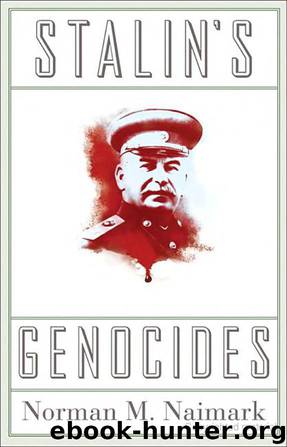Stalin's Genocides by Norman M. Naimark

Author:Norman M. Naimark [Naimark, Norman M.]
Language: eng
Format: epub
Tags: Europe, Modern, 20th Century, 9780691147840, General, Other, Military, Russia & the Former Soviet Union, History
ISBN: 9780691152387
Google: DFooT8zZ2hIC
Amazon: 0691152381
Publisher: Princeton University Press
Published: 2010-07-18T16:00:00+00:00
Some scholars would prefer not to use the term of genocide at all in historical studies of mass killing, argu-ing that it is too closely linked to international judicial norms and thus to proclamations of guilty or innocent.
The historians’ task, they maintain, is to liberate their narratives about mass killing from legal language. Others decide not to use the term because of the proliferation of the claims to genocide by a variety of peoples and groups that seek to strengthen the legitimacy of their historical sufferings, thus debasing and invalidating genocide’s original meaning. There are also scholars who object that the term has become excessively politicized, used to condemn some states and political systems, while justifying military intervention.10 These objections all have some merit; it is too easy to misuse the term genocide for a variety of purposes that have nothing to do with scholarship. But it also does not make sense for historians to sequester themselves from the international conversation about genocide, whether about the past or about the present. History and international judicial norms are inextricably intertwined.
The principled abstention from using the term genocide can serve politicized purposes as much as its application to specific historical circumstances.
Much of the tiptoeing around the problem of genocide when dealing with the litany of Stalinist mass crimes re-the crimes of stalin and hitler 125
lates to the language of the keystone of genocide legislation: the Convention on the Prevention and Punishment of the Crime of Genocide, adopted by the U.N. General Assembly on December 9, 1948. Here genocide is famously defined as a variety of “acts committed with the intent to destroy, in whole or in part, a national, ethnical, racial or religious group, as such.” This powerful idea of genocide took hold especially in the 1980s and 1990s in the international courts regarding crimes in former Yugoslavia (primarily of Serbs against Bosnian Muslims) and in Rwanda (Hutu against Tutsi). The growing body of scholarship in “genocide studies” has also been deeply influenced by the force of the convention and by the extraordinary impact of “Holocaust studies,” which argue in their most radical formulations that the Holocaust was a uniquely horrible event in the history of mass killing and that, at the very least, the mass murder of ethnic groups or nations should be at the core of genocide. But perhaps it is time to stop asking the question whether the group that is being murdered “in whole or in part” is a national, ethnic, and religious group, or whether it is a social, political, or economic group. What is, after all, the difference when it comes to human life?
Finally, I would like to return to the question of comparing Nazi and Soviet crimes of mass killing prompted by Conquest’s unforgettable image of Belsen and the Ukrainian famine. In Paul Hollander’s introduction to the vol-ume From the Gulag to the Killing Fields, a compendium of personal accounts of victims of repression in communist states, he suggests that while both Stalinist and Nazi
Download
This site does not store any files on its server. We only index and link to content provided by other sites. Please contact the content providers to delete copyright contents if any and email us, we'll remove relevant links or contents immediately.
| Africa | Americas |
| Arctic & Antarctica | Asia |
| Australia & Oceania | Europe |
| Middle East | Russia |
| United States | World |
| Ancient Civilizations | Military |
| Historical Study & Educational Resources |
Red Famine: Stalin's War on Ukraine by Anne Applebaum(2471)
Chernobyl by Serhii Plokhy(2135)
Midnight in Chernobyl by Adam Higginbotham(2084)
The House of Government by Slezkine Yuri(1848)
Midnight in Chernobyl: The Untold Story of the World's Greatest Nuclear Disaster by Adam Higginbotham(1777)
Red Shambhala by Andrei Znamenski(1752)
The Gulag Archipelago (Vintage Classics) by Aleksandr Solzhenitsyn(1730)
From Cold War to Hot Peace by Michael McFaul(1714)
All the Kremlin's Men by Mikhail Zygar(1703)
Putin's Labyrinth(1662)
Red Notice by Bill Browder(1596)
The Future Is History by Masha Gessen(1594)
From Russia with Lunch by David Smiedt(1554)
A People's Tragedy by Orlando Figes(1545)
The Romanovs by Simon Sebag Montefiore(1497)
How to Tame a Fox (and Build a Dog): Visionary Scientists and a Siberian Tale of Jump-Started Evolution by Lee Alan Dugatkin & Lyudmila Trut(1469)
Putin's Labyrinth: Spies, Murder, and the Dark Heart of the New Russia(1457)
The Lost Spy by Andrew Meier(1400)
Art and Revolution by John Berger(1391)
